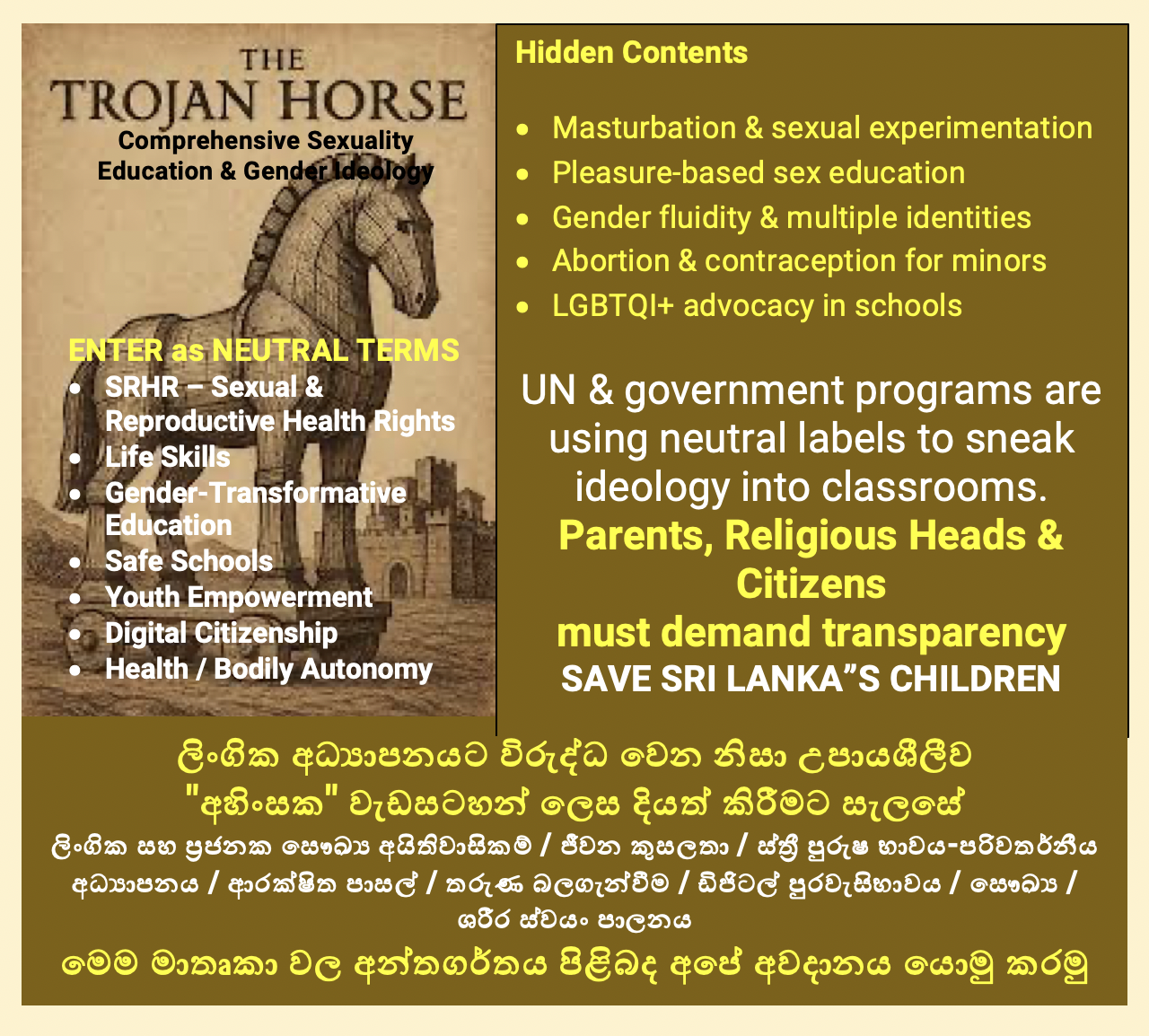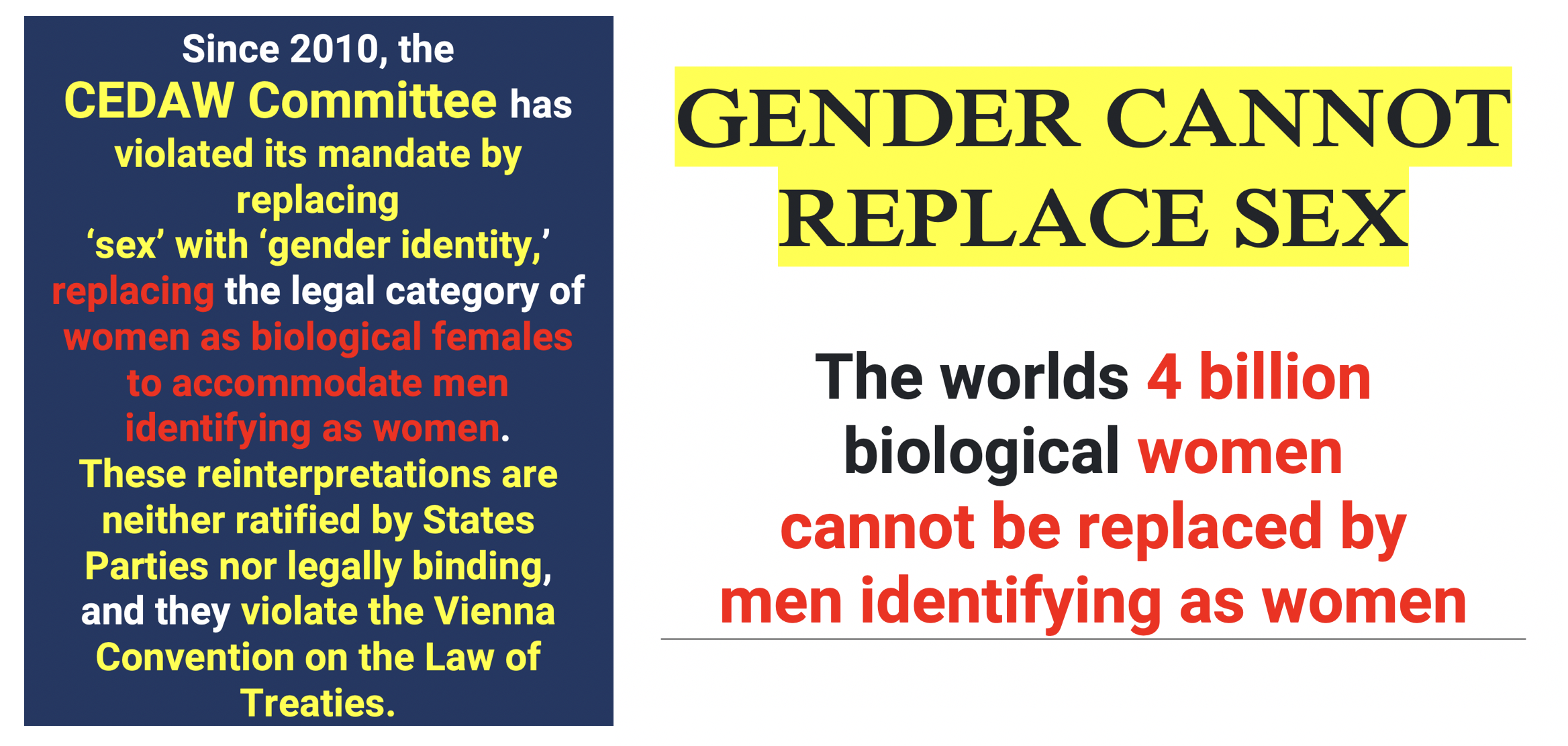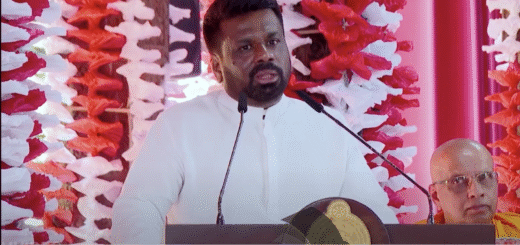CSE for Kids. DEI for Adults. Same Funders. Same LGBTQIA Agenda
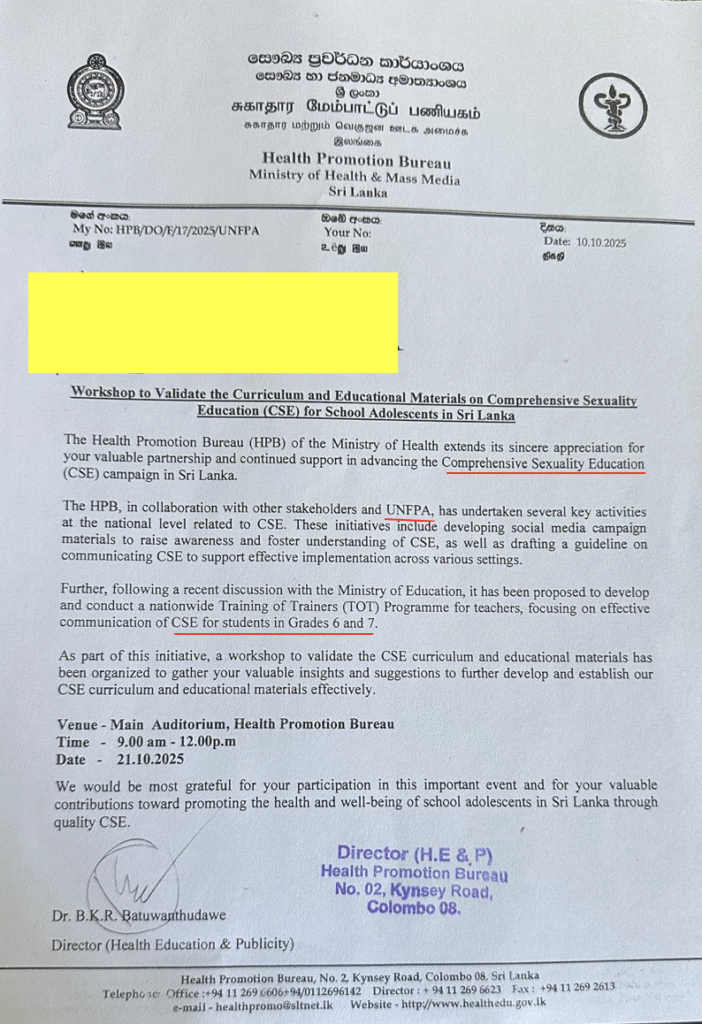
Around the world — and now proposed in Sri Lanka — two programs targeting schools and workplaces appear harmless but raise serious questions: CSE for children in schools and DEI for adults in workplaces.
On the surface both sound harmless. Who doesn’t want children protected from abuse? Who doesn’t want fairness in workplaces?
But behind the soft terminology and wording and promoted by handpicked trained “experts” lies a global LGBTQIA agenda, strategically designed and funded by the same network of organizations, enforced through:
- UN agencies — particularlyUNFPA, WHO, UNESCO
• Global NGOs and “human rights” groups
• Donor governments and foundations
• Multi-national corporations
The aim?
► Reshape morality, identity and family structures starting with children
► Silence dissent by labelling disagreement as “phobia”
► Create dependency on international governance over national sovereignty
Sri Lanka is the latest target.
The aim is to slowly dismantle representative national governance and bring decision making control under the UN agencies, NGOs & their activists.
Why change a system that already worked?
Sri Lanka already has sex education — focusing on:
• biological development
• safety and protection
• responsibility
• puberty, hygiene, reproduction
If Sri Lanka already has Sex Education in schools — teaching biology, puberty, personal safety, and how to protect the body from abuse, the most important question is:
Why replace “Sex Education” with “Comprehensive Sexuality Education”?
This is not an innocent name change.
It is a global policy shift — entering through Sri Lanka’s classrooms.
So why replace it?
Why not amend it & strengthen it.
Why reword Sex Education as “Sexuality Education”?
Should be asked. Until proper answers are given Sri Lanka should not allow so-called “experts” to draft any changes.
► Because CSE is not sex education.
It is sexuality ideology, introducing:
- Gender identity theory — “you can be born in the wrong body”
• Promotion of LGBTQIA identities as “normal lifestyle choices”
• Early sexual exploration — dating, pleasure, masturbation
• Rights-based approach thatremoves parental oversight
Children become “sexual beings” — not children.
That alone is a red flag.
Especially when promoters of LGBTQIA are the one’s also promoting DEI & CSE. This is where they all get trapped.
Sex Education vs. Sexuality Education — What’s the Real Difference?
| Traditional Sex Education | Comprehensive Sexuality Education |
| Biology, safety, health | Identity, attitudes, behavior change |
| Parent + teacher guidance | “Children’s sexual rights” narrative |
| Cultural boundaries respected | CSE frameworks often challenge traditional cultural boundaries |
| Focus: Protect children | Focus: Explore identity & sexuality |
Source: Global CSE guidelines vs. traditional school curricula
International agencies openly state that CSE aims to:
- “Transform social norms”
https://www.unfpa.org/sites/default/files/pub-pdf/ITGSE.pdf?
- “Challenge traditional gender roles” – https://www.unfpa.org/sites/default/files/pub-pdf/UNFPA%20Operational%20Guidance%20for%20CSE%20-Final%20WEB%20Version.pdf?
- “Promote sexual rights from early ages”
https://www.who.int/news-room/questions-and-answers/item/comprehensive-sexuality-education?
This is ideology, not education.
Childhood should be protected, not politicized.
Who pushed this change?
No Sri Lankan Parent asked for it.
The shift is not due to local research, local demand or local medical concerns.
The pressure and funding come from:
• UNFPA — the principal global driver of CSE
• International activist foundations
• Reporting conditions tied to foreign aid
• Private corporate sponsorship aligned with Pride activism
Education curriculum design is a sovereign national matter.
When it is outsourced to funders with agendas, local values disappear.
Local concerns become irrelevant.
Is CSE helping Children? The Evidence Says — No.
Countries that implemented CSE widely now face:
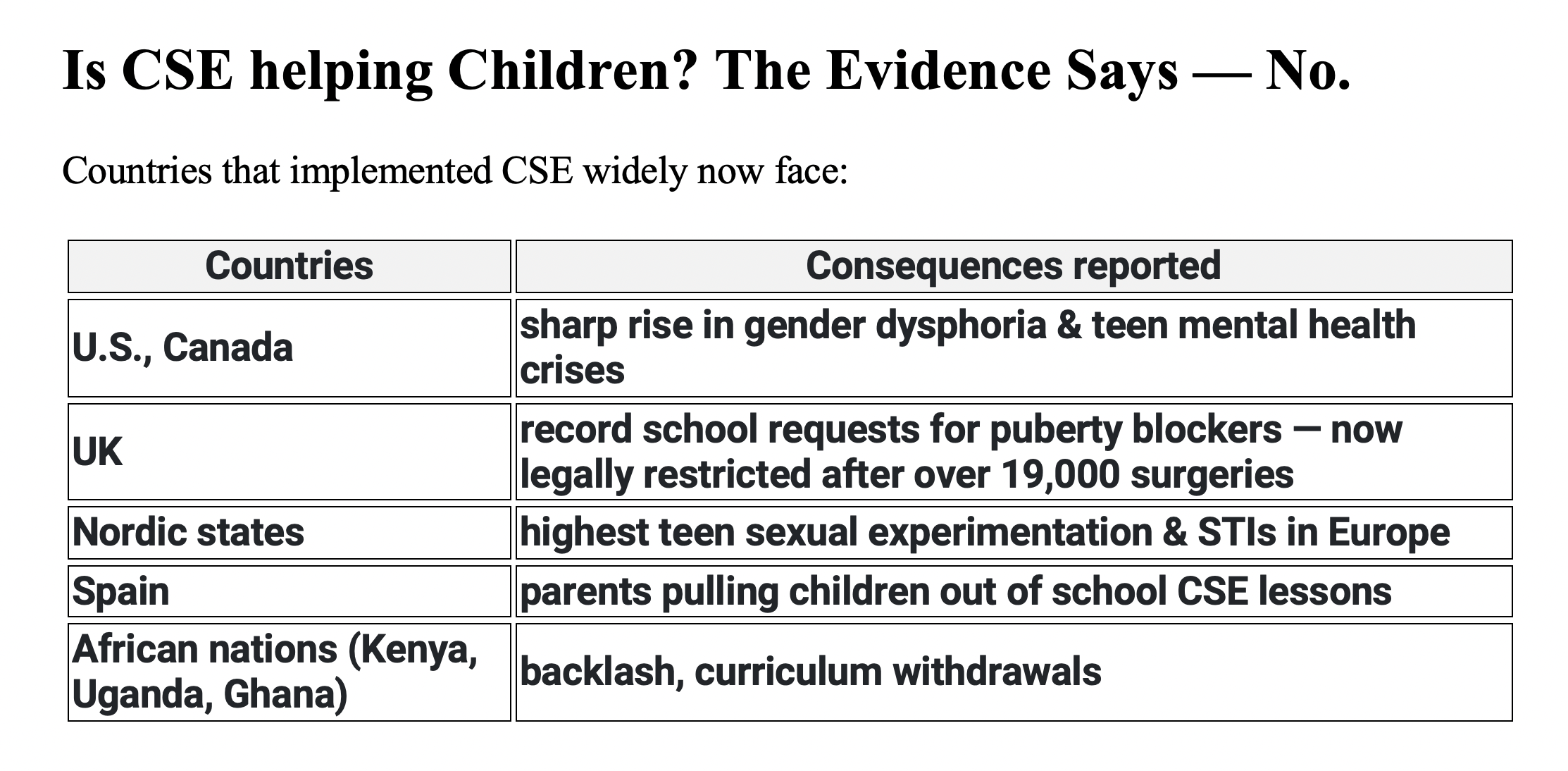
Courts and medical bodies in Europe have raised concerns about aspects of CSE and early gender identity interventions for minors.
Some nations have cancelled or reversed CSE rollout entirely.
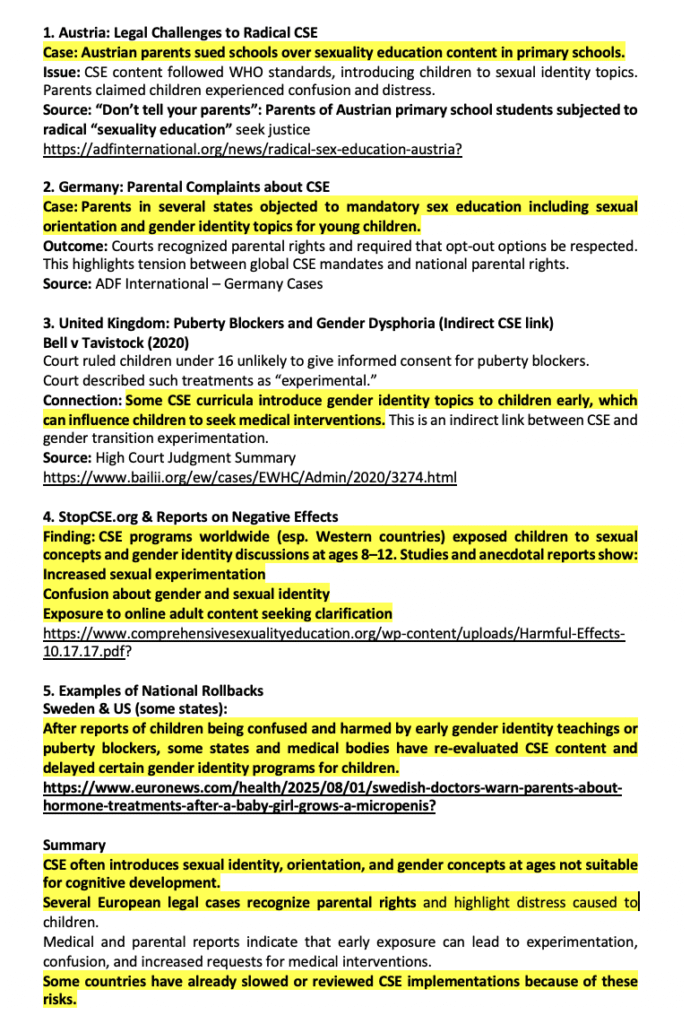
- https://adfinternational.org/news/radical-sex-education-austria?
- https://www.bailii.org/ew/cases/EWHC/Admin/2020/3274.html
- https://www.comprehensivesexualityeducation.org/wp-content/uploads/Harmful-Effects-10.17.17.pdf?
- https://www.euronews.com/health/2025/08/01/swedish-doctors-warn-parents-about-hormone-treatments-after-a-baby-girl-grows-a-micropenis?
What Happened in Countries That Rolled Out CSE?
International medical, educational and legal data report:
- Early sexualization
- Child-on-child exploitation
- Teen pregnancies & abortions up
- Spike in STIs
- Classroom exposure to pornographic content
- Gender confusion and mental health breakdown
- Rapid growth of puberty blockers and surgeries
So today, multiple countries are reversing:
UK • Sweden • Finland • France • Norway
If the West is backtracking —
why is Sri Lanka blindly stepping forward?
DEI: The Other Arm of the Same Agenda
Same network, different tools targeting adults and children
| Who is targeted? | Method used? | Purpose |
| Adults (Workplaces) | DEI (Diversity, Equity & Inclusion) | LGBTQIA policy influence |
| Children (Schools) | CSE | CSE — introduces gender identity concepts and normalization of LGBTQIA identities |
Same funding networks.
Same outcomes.
Different age groups.
DEI reshapes workplaces.
CSE reshapes childhood.
This is a one agenda — two fronts operation.
While CSE rewires children, DEI rewires adults.
Corporations are pressured to:
• adopt gender pronoun policies
• require LGBTQIA allyship training
• change hiring to “identity quotas”
• silence staff who disagree
The outcome?
- workplace conflicts
• declining productivity
• resignations and litigation
• costs withzero ROI
Several Fortune 500 companies have cut DEI funding after backlash and losses —
exactly why donors are shifting focus to now indoctrinate children instead.
The Pattern Is Clear
CSE + DEI = Full-spectrum cultural capture
| Target | Mechanism | Objective |
| Children | CSE | redefine identity & sexuality early |
| Youth | University activism | lock in beliefs as ideology |
| Adults | DEI | enforce silence & compliance |
| Society | Media & Lawfare | criminalize disagreement |
This is not organic change.
It is a strategic social re-engineering program.
Why UNFPA?
UNFPA is:
- Anintervening petitionerto repeal Penal Code 365/365A
— wanted the removal of child protection age clauses
● A major funder of LGBTQIA advocacy worldwide and across Sri Lanka
● A major funder and promoter of sexual and reproductive health initiatives globally (abortion), including programs aligned with LGBTQIA advocacy.
● NOW a stakeholder in Sri Lanka’s curriculum change process
So, we must ask:
Why should a foreign agency that advocates child sexual autonomy help write our school textbooks?
They tell us “Trust the Process”
This is Not a Safeguard
Legalizing indoctrination brings irreversible consequences.
We are told:
- “Experts are involved”
● “All stakeholders agree”
● “Trust the process”
Yet:
✔ Parents are not shown the new syllabus
✔ Content is not made public before approval
✔ Donor-driven frameworks shape national policy behind closed doors
✔ A handful of locals may object but they are generally outnumbered or silenced.
Transparency is zero.
Accountability is missing.
Cultural risk is extreme.
Key Questions Sri Lankan Parents MUST ASK which Lawmakers MUST ANSWER
The Need and Rationale:
- Why is Sri Lanka replacing its existing sex education with a foreign-designed CSE curriculum?
- What specific “deficiencies” in our current system justify introducing CSE and LGBTQIA content hidden under new terminology?
- Who proposed the adoption of CSE, and what evidence or research proves it benefits Sri Lankan children?
- Where is the local research validating the need and impact of this new curriculum on children’s well-being and safety?
Authorization and Oversight:
- Who approved UNFPA’s involvement in designing the national curriculum, and under what legal authority?
- Why involve external organizations in national school policy rather than strengthening and improving local expertise?
- Why is the curriculum hidden from parents, and what guarantees exist to protect parental rights and cultural values?
- What protections are in place for parental consent and opt-out rights?
Content and Ideology:
- Why is LGBTQIA ideology included when it is unrelated to child protection, health, or traditional sex education goals?
- Who funds the NGOs and international networks advocating for CSE, and what conditions come with that funding?
Global Lessons and Consequences:
- Which countries have rolled out CSE, faced adverse consequences, and even reversed it? Why is this evidence being hidden from us?
- Why are we replicating a model that has failed elsewhere instead of adopting proven, locally relevant approaches?
National Sovereignty and Cultural Protection:
- Who demanded Sri Lanka adopt a global CSE template, and what authority do they have over our national education policy?
- What guarantees exist that this curriculum will respect cultural norms, family values, and national sovereignty?
Transparency and Public Access:
- Why has the draft CSE curriculum not been made publicly available for review before approval?
- What mechanisms exist for parents, teachers, and civil society to provide feedback on the curriculum before it is implemented?
Child Safety and Psychological Impact:
- How does CSE ensure children are not exposed to age-inappropriate sexual content, experimentation, or psychological pressure?
- What safeguards exist to prevent early sexualization, gender confusion, and mental health risks in children?
Who monitors the outcomes of CSE implementation, and what accountability measures are in place if harm occurs?
Legal and Policy Implications:
- Does adopting a foreign-designed CSE curriculum comply with Sri Lanka’s national laws, constitution, and existing child protection statutes?
- How does CSE align with the rights of parents under Sri Lankan law to guide their child’s moral, cultural, and educational upbringing?
Long-term Consequences and Social Engineering:
- What is the long-term vision of CSE for Sri Lanka — is it purely education or part of a broader social engineering agenda?
- How will the state ensure that children’s innocence, family structures, and cultural values are not undermined under the guise of “education”?
Funding Influence and Conflicts of Interest:
- Are there conflicts of interest between curriculum designers, funders, and international agencies promoting CSE?
- Will Sri Lanka retain full decision-making authority over the curriculum, or will funders/UN agencies dictate changes in the future?
If authorities cannot answer these basic accountability questions, the program should not proceed.
Protecting Children Is Not “Phobia”
It is duty — moral, constitutional and civilizational.
Sri Lanka must decide:
Do we want our children to inherit our values?
Or do we surrender them to global identity politics controlled by donors?
What is really happening is NOT a Reform — It’s a Takeover
Sri Lanka’s cultural foundation is family.
Sri Lanka’s national identity is dignity.
Sri Lanka’s children deserve innocence.
The CSE model treats children as:
- sexual beings, not students
●rights activists, not minors
● targets, not treasures
We cannot allow:
❌ Global donors to dictate social values
❌ Teachers to act as activist recruiters for job security & no choice.
❌ Classrooms to become sexual identity labs
Our Duty as a Nation
YES — protect children from abuse
YES — teach safety, boundaries, and biology
NO — sexualize childhood
NO — foreign-funded identity programming
ADULT IMMORALITIES DO NOT NEED TO BE FED INTO CHILDREN AND NORMALIZED
Trading children’s innocence for donor money – is DISGUSTING
Our children’s minds are the last national resource.
If we surrender that — we have surrendered everything.
Sri Lanka MUST decide Sri Lanka’s future.
Not UN agencies.
Not donor agendas.
Not NGO activists posing as experts.
Not public servants who hide behind the politicians and draft the damage while people’s attention is against the politicians (these public servants are actually the worst lot doing the maximum damage & harm from behind the scenes)
We must defend the children & their right to childhood. Their innocence should not be robbed by experimental ideologies.
Protecting children is a moral and national duty. Sri Lanka’s classrooms should teach safety, biology, and respect for cultural values — not become sites for global identity experiments.
Protect Childhood. Protect Culture. Protect Sovereignty.
Shenali D Waduge

